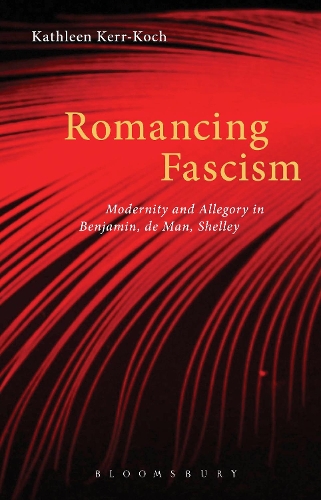
Romancing Fascism: Modernity and Allegory in Benjamin, de Man, Shelley
(Paperback)
Available Formats
Publishing Details
Romancing Fascism: Modernity and Allegory in Benjamin, de Man, Shelley
By (Author) Dr. Kathleen Kerr-Koch
Bloomsbury Publishing PLC
Bloomsbury Academic USA
23rd October 2014
United States
Classifications
Tertiary Education
Non Fiction
809.915
Physical Properties
Paperback
240
Width 152mm, Height 229mm
327g
Description
Romancing Fascism argues that intellectual responsibility can only be safeguarded if criticism is mobilised both as a poetic and as a critically enlightened endeavour. In this analysis of allegory as a function of modernity, what is made clear is the difficulty, if not impossibility, of definitively determining the genealogical antecedents of intellectual trends, particularly those considered pernicious to clear thinking. Thus Kerr-Koch takes a wide-ranging approach to the analysis of allegory as it is treated by three controversial writers whose works flank the 19th and 20th centuries, the middle and late periods of what we call modernityWalter Benjamin, Paul de Man and Percy Bysshe Shelley. These three writers have been chosen because they have been at some point recuperated for a theory of postmodernism', a term that for some theorists represents liberal free play, and for others represents a lack of rigour and a pernicious corruption of thought.
Reviews
Kerr-Kochs thoroughly researched and densely argued study analyses the uses of allegory in... three (apparently) disparate writers. Kerr-Koch boldly attempts the rehabilitation of de Man, so drastically fallen from critical-theoretical favour, in the context of an examination of the positive resistant potential of allegory in the contemporary world. -- Patrick Williams, Nottingham Trent University, UK
Kathleen Kerr-Koch has here devised an original and highly revealing constellation of three writers Shelley, Benjamin, and de Man whose work she shows, through careful and perceptive close-reading, to speak very directly to crucial issues in present-day literary and cultural theory. Above all she brings out their critical power, when conjoined in this way, to focus and refine our thinking about the reception-history of poetic and philosophical texts and, beyond that, their potential impact on the course of historical events. This involves a subtly inflected understanding of the structure and workings of allegory as theorised and exemplified in the work of her chosen authors. Kerr-Koch also demonstrates how wide of the mark, nave and ideologically suspect are those other, less scrupulous readings that take for granted a simplified model of intellectual history and a grossly reductive or distorting view of the influences active in current (usually deprecated) movements of thought. This book is a fine achievement and should remind us what is politically at stake when well-placed conservative antagonists of theory and of deconstruction in particular take it as their stalking-horse for an overt or covert attack on the project and values of enlightened critique. -- Christopher Norris, Distinguished Research Professor in Philosophy, Cardiff University, UK
Author Bio
Kathleen Kerr-Koch is Senior Lecturer in Literary History and Literary Theory at the University of Sunderland, UK. She has published articles on Paul de Man, Walter Benjamin, Theodor Adorno, Julia Kristeva, Barbara Herrnstien-Smith, Noam Chomsky, Herbert Marcuse, Christopher Norris, A.J. Greimas, Hans R. Jauss and Barbara Ehrenreich as well as essays on modernity, autobiography and race, nation and ethnicity. She has also been a Visiting Lecturer at Delhi University, India.
